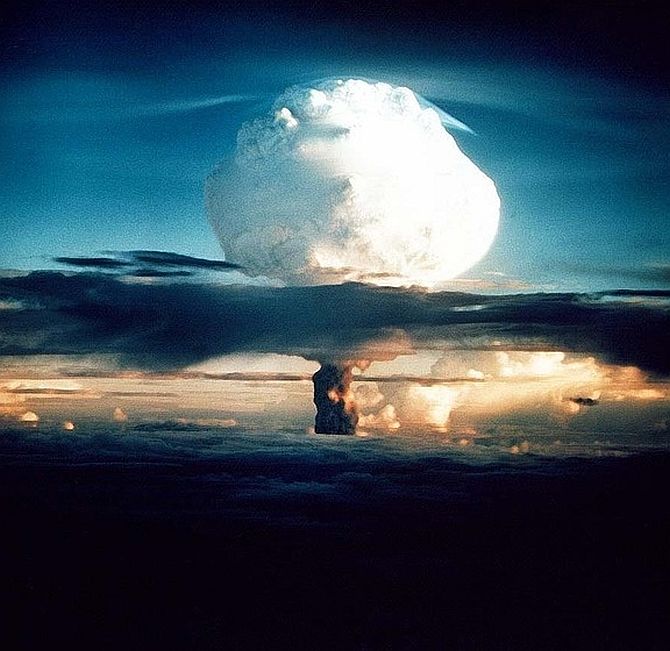... and ONE man could be the reason for that, say scientists.

The Bulletin of Atomic Scientists on Thursday announced that the Doomsday Clock now stands at two-and-a-half minutes to midnight, suggesting that existential threats now pose a greater danger to humanity than they have at any time since the height of the Cold War.
Scientists blamed a cocktail of threats ranging from dangerous political rhetoric to the potential of nuclear threat as the catalyst for moving the clock closer towards doomsday.
"This year's Clock deliberations felt more urgent than usual... as trusted sources of information came under attack, fake news was on the rise, and words were used by a President-elect of the United States in cavalier and often reckless ways to address the twin threats of nuclear weapons and climate change," Rachel Bronson, the executive director and publisher of Bulletin of the Atomic Scientists, said in a statement.
While many threats played into the decision to move the clock 30 seconds forward from where it was in 2016, one person in particular prompted the scientists to act.
"Never before has the Bulletin decided to advance the clock largely because of the statements of a single person. But when that person is the new president of the United States, his words matter," David Titley and Lawrence M Krauss of the Bulletin wrote in an New York Times op-ed.
"This is the closest to midnight the Doomsday Clock has ever been in the lifetime of almost everyone in this room. It has been 64 years since it was closer," Krauss, a theoretical physicist at Arizona State University and the chair of the Bulletin's board of sponsors, said.
The statement said, "Just the same, words matter, and President Trump has had plenty to say over the last year. Both his statements and his actions as president-elect have broken with historical precedent in unsettling ways. He has made ill-considered comments about expanding the US nuclear arsenal. He has shown a troubling propensity to discount or outright reject expert advice related to international security, including the conclusions of intelligence experts.
"And his nominees to head the Energy Department and the Environmental Protection Agency dispute the basics of climate science. In short, even though he has just now taken office, the president’s intemperate statements, lack of openness to expert advice, and questionable cabinet nominations have already made a bad international security situation worse."
The scientists also cited the rise of "fake news" as a concern.
"In addition to the existential threats posed by nuclear weapons and climate change, new global realities emerged, as trusted sources of information came under attack, fake news was on the rise, and words were used in cavalier and often reckless ways. As if to prove that words matter and fake news is dangerous, Pakistan’s foreign minister issued a blustery statement, a tweet actually, flexing Pakistan’s nuclear muscle—in response to a fabricated “news” story about Israel. Today's complex global environment is in need of deliberate and considered policy responses. It is ever more important that senior leaders across the globe calm rather than stoke tensions that could lead to war, either by accident or miscalculation," the Bulletin said in a statement.
The clock has edged closer to midnight only once before: In 1953, it was moved to two minutes to midnight after the United States and the Soviet Union both tested hydrogen bombs, kicking off the mid-century nuclear-arms race. It remained at two minutes to midnight for another seven years.
Representative Image: Courtesy Pixabay











 © 2025
© 2025